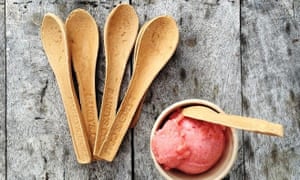Bakeys wants us to eat our way out of plastic pollution
Plastic waste covers our oceans and landfill. The past 70 years of plastic waste have resulted in pollution so ubiquitous scientists say it’s a marker of a new geological epoch, the manmade Anthropocene.
Plastic cutlery is a contributor to this enormous problem – estimates suggest the US alone uses 40bn plastic utensils a year – but the founder of Indian cutlery company Bakeys thinks he might have a solution. Cutlery you can eat.
 The vegan friendly spoons are made from rice, wheat and sorghum, an ancient grain originally from Africa. Sorghum was chosen as a primary ingredient for its tough quality (it doesn’t go soggy in liquids) and because it is suitable for cultivation in semi-arid areas.
The vegan friendly spoons are made from rice, wheat and sorghum, an ancient grain originally from Africa. Sorghum was chosen as a primary ingredient for its tough quality (it doesn’t go soggy in liquids) and because it is suitable for cultivation in semi-arid areas.
The cutlery comes in three flavours – savoury (salt and cumin), sweet (sugar) and plain. “It tastes like a cracker, a dry cracker because we don’t put any fat in it. It can complement any food. The taste of the food gets into the spoon,” says company founder Narayana Peesapaty.
Bakeys’ crowdfunding campaign on Kickstarter had a goal of $20,000 (£14,000) but has already raised 12 times that. A parallel campaign on Indian platform Kettohas exceeded its 100,000 rupee (£1,050) goal 24 times over. Peesapaty says he has had emails pouring in from around the world. “It is so simple and it is this simplicity that has caught the attention of most people,” he says.
With a background in forest management, Peesapaty previously worked at the International Water Management Institute’s crop research centre and says he wanted to use a raw material that won’t put much pressure on water resources.

Even if the spoons are dumped after use, they decompose in a few days, according to the company. Bakeys says this makes its product more environmentally friendly than biodegradable plastic utensils made from corn plastic, which need to be subjected to high heat in specialised composting facilities to break down.
The spoons are packaged in paper bags and shipped using styrofoam to prevent breakage. Peesapaty acknowledges this is the least sustainable part of the operation and is looking for alternatives.
Although the edible cutlery has only just found a following – a recent Facebook video with Peesapaty has had more than 5m views – Bakeys has been making spoons at its factory in Hyderabad, India, since 2011, where it employs nine women. It sells 1.5m spoons per year to catering companies serving food at weddings and other events, but Peesapaty hopes take-up among food vendors
Comments
Post a Comment